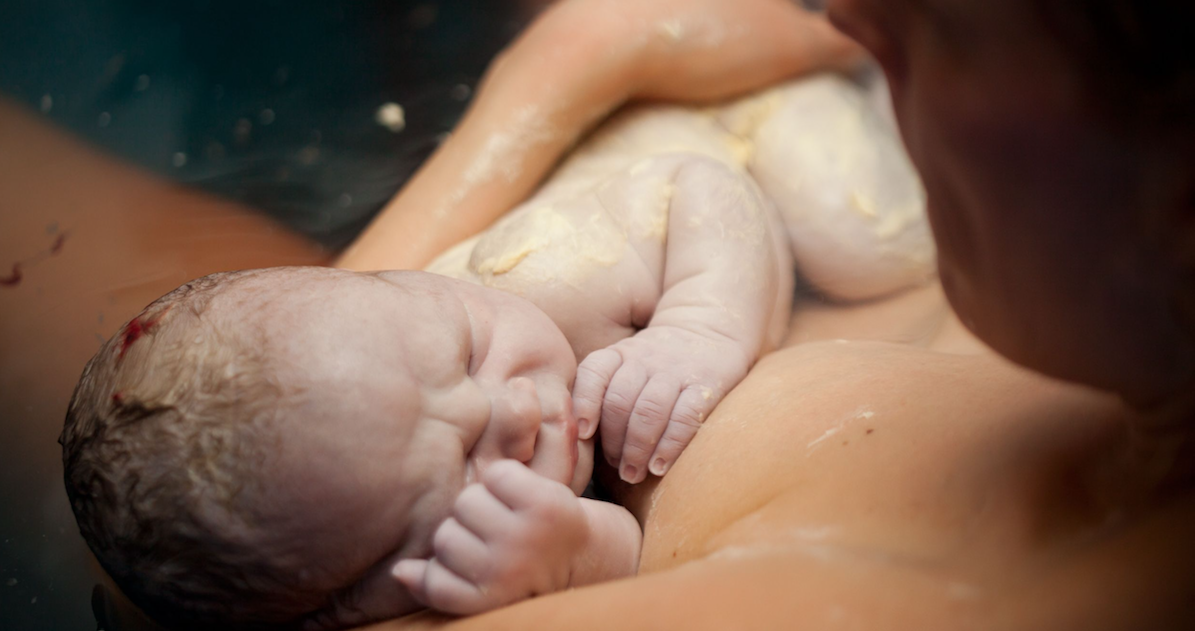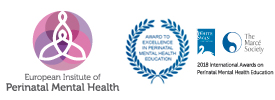
by Ibone Olza and Sharon E. MacDonnell
Originally Published in: Ecopsychology. June 2010, 2(2): 105-109.
ABSTRACT
How and when does the ecological unconscious develop in the human newborn? Research from the neurobiological findings of attachment theory has shown the deleterious effect of mother separation on the brain development of newborns. Innovations in newborn care, research into the myriad personal and social advantages of breastfeeding, and the introduction of Kangaroo Mother Care (KMC) has generated new evidence to suggest that the human newborn’s natural habitat is skin-to-skin contact with the mother. In this habitat all newborns have a programmed behavior, which in the immediate period after birth is to breastfeed. The Authors’ hypothesis is that the deep divide humans currently experience from the natural world may be a psychological sequel of early environmental disruption. Traumatic medical interventions during birth, the loss of breastfeeding and subsequent changes in brain chemistry from prolonged mother separation could normalize a disconnection from nature. From an eco-psychological point of view, understanding the implications of increased medical intervention in birth and early childcare, and how the return to the ‘original paradigm’ of more physiological childbirth and childcare practices, could lead to a greater understanding of how the ecological unconscious develops, or fails to develop, in children of urbanized industrialized nations.
Key words: Eco-psychology, Womb-Ecology, Birth Psychology, Breastfeeding, Eco-feminism, Attachment Theory.
Eco-psychology explores the deep evolutionary history of relationships between humans and nature, and aims to understand the psychological processes that either bonds us with nature or alienates us from the natural world. A central idea is that human health, including physical, psychological and spiritual wellbeing, is dependent on the health of our planet and all the ecosystems functioning within it. One of the goals of Eco-psychology is to heal the divide created by our epistemological fallacy: the tendency to think of mind and nature as separate. The term “ecological unconscious” was coined by Roszak (1992) to define “our need for a sympathetic bond with the natural world as a defining feature of human consciousness” (Roszak, 2009), and also as the one aspect of consciousness that has been weakened in modern urban-industrial cultures. Understanding how this ecological unconscious develops from infancy could help eco-psychologists develop better ways of promoting more balanced and holistic mental health. It would offer new approaches for eco-therapists, especially those working with children, pregnant women and new fathers. In this paper we will summarize recent findings from the interrelated fields of womb ecology, birth psychology, neurobiology of attachment and eco-feminism that we think can shed light on this topic, and suggest exciting directions for future research in the new and necessary field of developmental eco-psychology.
How does attachment to nature start?
As caesarean rates continue to increase worldwide, and the percentage of breastfeeding women in most Western countries continues to drop, irrespective of World Health Organization (WHO) recommendations, there is a growing awareness about the risks of excessive medical interventions in childbirth and postpartum care (Johanson, Newburn, & Macfarlane, 2002). Consumer groups in industrialized countries are now demanding a return to the midwifery model of prenatal and postpartum care (Goer, 2004). Midwifery care puts women back at the centre of the birth scene and respects the physiology of normal labor. The process of giving birth is genetically encoded in the body. Natural physiological childbirth without the use of drugs and medical interventions is a total experience involving body, mind and spirit. For this natural labor to happen, it is crucial to respect the laboring woman’s need for privacy, safety, and letting go, meaning a capacity to disconnect cortex activity and let the primitive brain do the work. To disrupt the natural flow of this process can have far reaching implications in the psychological wellbeing of both mother and infant.
There is also an increased awareness among neuroscientists as well as birth activists, of the importance that ‘mothering hormones’ play in the development of love and attachment. One of these hormones is cortisol, which plays a major role in a person’s emotional responses. In reviewing attachment neurobiology studies, researchers have concluded that mother-infant synchrony keeps the baby in a state of hormonal balance (Feldman, Weller, Zagoory-Sharon, & Levine, 2007). The constant presence of the infant simultaneously helps the mother’s body chemistry stay in optimal balance (Winberg, 2005). Maternal behaviors, such as regular breastfeeding, can help to maintain elevated levels of the mothering hormones prolactin and oxytocin. These biological helpers aid mothers and also fathers in developing positive nurturing attachments to their infants (Feldman, Gordon, Schneiderman, Weissman, & Zagoory-Sharon, 2010).
In evolutionary biology, a niche can be described as the natural history of a species: where it lives, what it eats, and so forth. Those constraints in turn have an effect on behavior. Following neonatologist Nils Bergman’s suggestion, we propose that the human newborn’s niche is skin-to-skin contact with its mother (Bergman, 2005), and breastfeeding immediately after birth and regularly thereafter, until spontaneous weaning. It has been demonstrated that removing an organism from its natural habitat will create disturbances in the psychology of that organism. We consider the mother and her naturally produced breast milk, warmth and hormonal affects on the infant, to be the natural habitat of a newborn infant.
Our hypothesis is that if the physiology of natural childbirth and the evolutionary importance of breastfeeding is respected and supported, and early childrearing practices are more physiologically focused, it may be easier for children to develop connections to their natural environment. In other words, we pose the question: could natural childbirth practices which promote less invasive maternal care, and childrearing practices which encourage a secure attachment to parents, impact or facilitate attachment to nature from early infancy?
French obstetrician Michel Odent, who coined the term “womb ecology”, which is the study of interactions between womb environment and human fetal development, says “If the planet remains inhabitable – a hypothesis we must not eliminate – it implies that “Homo Superpredator” will eventually be overtaken by “Homo Ecologicus”. Homo Ecologicus will be characterized by a propensity to unite and establish a global awareness, and also by an ability to develop a fundamental respect for Mother Earth. There are many obstacles to the evolution towards Homo Ecologicus, and finally towards ecological societies. However the focus should be on the period surrounding birth, which is routinely disturbed. This period is considered critical at a time when scientific advances help us to formulate new questions and to understand how the capacity to love develops. The advent of “Homo Ecologicus” is not utopian.”(Odent, 2005)
The psychology of normal birth has received very little attention. Daniel Stern in his book “The Birth of a Mother” (1998), describes how new mothers often have “a deep feeling of being part of earth’s fertility, of being a member of the world and belonging to eternity” (Stern & Bruschweiler-Stern, 1988). As a child psychiatrist I have listened to many women recount their birth experiences. When the birth goes undisturbed, many laboring women do feel a strong connection with the earth and other laboring women all around the world. While laboring, several women have described something akin to mystical experiences, a feeling of being part of the universe and fully connected to nature or the Earth. Mothers can remember vividly how they perceived trees, plants or their pets more beautiful than ever while they were dilating. During labor, many women describe feeling a deep connection with surrounding nature. As one woman said “When I looked at my baby’s eyes for the first time I understood something very deep about the entire Universe. I felt I was a part of the whole living Earth.” Metaphors of Mother Earth and a joyful connection with nature are recurrent topics in many childbirth stories (i.e. see Chant of the Pregnant Goddess, Birthlove web site.) (McCarthy, 1999)Motherhood and fatherhood can be very powerful transformative experiences that sometimes bring an increased ecological consciousness.
It would be interesting to know if feeling connected to earth and nature is a normal feeling during physiological birth and what role that could play in the development of ecological unconscious in the human newborn. It would also be necessary to research if a disturbed birth (i.e. instrumental delivery or planned caesarean) can alter that development as it has shown it can affect maternal postpartum mood or breastfeeding (Beck & Watson, 2008; Ryding, Wijma, & Wijma, 1997).
Part II: Restoring the original paradigm
Part III: Breastfeeding, sustainability and Eco-feminism







